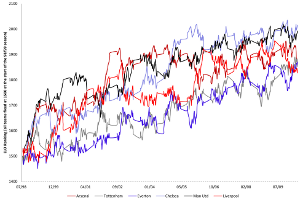The best football team in England?
ELO Ratings of English football league teams - 98/99 to 09/10
Introduction
How do you rate how good a football team is? The traditional way is to use a league table - count the number of wins and losses over a season, and see who is the best. However, that only allows you to discuss the relative merits of a group of teams over that year. It doesn't allow accurate comparison between years, as changes in the strength of the division can lead to weaker teams gaining more points (for instance, compare the number of points per game Rangers and Celtic get in Scotland, compared to the number Manchester United or Arsenal get in England). However, there are other methods...The ELO rating system (wiki link) is used by FIDE to rank chess players. After each game (or tournament), a player's rating can be calculated from their existing rating, their score and the score they were expected to achieve given the rating(s) of the opposition. Thus a good result against strong opposition is worth more points than a good result against poor opposition. Similar ratings have been produced for international football teams. The statistics on this page attempt to undertake an analysis of football teams in the English domestic game.
Method
The ELO system used here follows the equation: Rnew=Rold+K*(Score-Expectation), with a K factor of 32 used.Expectation is calculated using 1/(1+10(Rplayer-Ropponent)/400) - thus a player with an ELO rating 400 points more than his opponent has 10x the probability of winning. As the ELO rating system is an iterative system, over time the ELO rating of a team should tend towards its true value, and this therefore defines the variation in the rating system itself.
The player's score is set equal to 1 if they win the game, 0.5 if the result is a draw and 0 for a loss. Unlike the international football team ratings above, no weighting of games by type has been attempted.
At the start of the 99/00 season, all teams are given the starting rating of 1500. No weighting based upon division strength has been made
Data
All football results are taken from the RSSSF, and are assumed to be correct. The lists of results published at that site for the English league and cup competitions between the 98/99 and 09/10 years were parsed using software developed by myself. Given irregularities in the naming convention of certain teams, the formatting of the results lists (I have attempted to fix the naming convention and result formatting) and the incompleteness of the results for lower divisions (particularly in earlier seasons), perfect accuracy for lower league teams could not be guaranteed. However, accuracy for the upper echelons is high. Over 28 thousand football matches are used in this calculation.Results
Firstly, team ratings at the top end show inflationary characteristics; a known problem of the ELO system. Direct comparison between teams by ELO rating cannot account for this phenomenon (this problem also applies to finding the 'Greatest Chess Player in History'). However, the psychological problems of the ELO system (such as players choosing only to play games against weak opponents with inflated ratings) do not affect this work. An alternative approach is to use the ratings to find which team has the greatest level of dominance versus its contemporaries.Figure 1, below, shows the variation in ELO ratings for a selection of the last six English football teams to qualify for the Champions League. Three obvious periods of footballing superiority show themselves:
- The Manchester United team at the turn of the decade
- The Arsenal team who won the double in 01/02 (who peaked at the start of their unsuccessful 02/03 season). Oddly, the Invincibles team that did not lose a game during the 03/04 season was only slightly better by ELO rating than the 2nd place 02/03 team.
- Jose Mourinho's Chelsea team of 05/06.
This page contains a table showing the ELO ratings at the end of the 09/10 season, for teams that have >10 games within the database. In order to placate those who feel he may be biased, the author would like it known that his team is Coventry, who do not come out of this analysis particularly well.
Using ELO ratings as a guide to future results
A further question must be asked. Does the current rating of a team have a bearing on its next game? The answer, it seems, is yes. For every game in the database, the 'current' ELO rating of each team was calculated. Games were then binned by ELO rating differential, and the average return for each bin was calculated (1 for a win, 0 for a loss, 0.5 for a draw). Figure 2, below, shows the average return of a team vs the difference in ELO rating between that team and its opponent. The weaker the opposition (by current ELO rating), the greater the average return.--
David Hill
